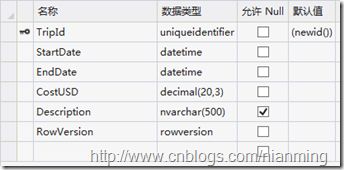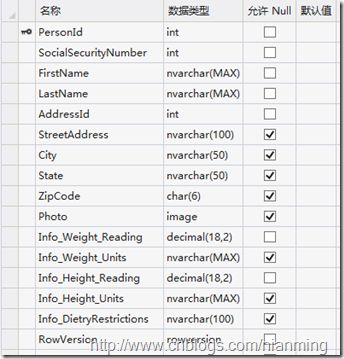【配置属性】—Entity Framework实例详解
Entity Framework Code First的默认行为是使用一系列约定将POCO类映射到表。然而,有时候,不能也不想遵循这些约定,那就需要重写它们。重写默认约定有两种方式:Data Annotations和FluentAPI。Data Annotations在功能上是Fluent API的子集,在一些映射场景下使用Annotations不能达到重写的目的,因此本篇文章中使用Fluent API配置属性。
一、Fluent API配置属性
Code First Fluent API通常情况下是在DbContext的派生类中重写OnModelCreating方法。
1.配置Length
Length用来描述数组的长度,当前包括string和Byte数组。
默认约定:Code First对string或byte数组的默认长度约定是max。注意:Sql Server Compact中默认最大数组长度是4000。
重写约定:使用HasMaxLength(nn),参数为可空整数。
1: Property(t => t.Name).HasMaxLength(50);
另外关于Length的Fluent API还有下面2个:
IsFixedLength(),配置属性为固定长度。
IsMaxLength(),配置属性为数据库提供程序允许的最大长度。
2.配置Data Type
Data Type表示将.NET类型映射到的数据库的数据类型。
默认约定:列的数据类型由使用的数据库提供程序决定。以SQL Server为例:String->nvarchar(max),Integer->int,Byte[]->varbinary(max),Boolean->bit。
重写约定:使用HasColumnType(“xxx”),下面列子的Photo是byte[]类型,配置映射到image数据类型:
1: Property(t => t.Photo).HasColumnType("image");
3.配置允许为空和不允许为空
默认约定:主键属性不允许为空,引用类型(String,array)允许为空,值类型(所有的数字类型,Datetime,bool,char)不允许为空,可空的值类型Nullable<T>允许为空。
重写约定:使用IsRequired()配置不允许为空,使用IsOptional()配置允许为空。下面配置Name属性为不为空:
1: Property(t => t.Name).IsRequired();
4.配置属性到指定列
默认约定:映射到与属性名相同的列。
重写约定:使用Property(t=>t.属性名).HasColumnName(“xxx”)。下面配置Name映射到DepartmentName:
1: Property(t => t.Name).HasColumnName("DepartmentName");
5.配置主键
默认约定:(1)属性名为ID或Id的默认为主键
(2)类名+ID或类名+Id默认为主键 (其中ID或Id的优先级大于类名+ID或类名+Id)
重写约定:使用HasKey(t=>t.属性名)。下面将BlogId配置为主键:
1: HasKey(t => t.BlogId);
6.配置组合主键
下面的例子将DepartmentId和Name属性组合作为Department类型的主键:
1: HasKey(t => new { t.DepartmentId, t.Name });
7.配置Database-Generated
默认约定:整型键:Identity。
重写约定:使用Property(t => t.属性名).HasDatabaseGeneratedOption(DatabaseGeneratedOption)。
DatabaseGeneratedOption枚举包括三个成员:
(1) None:数据库不生成值
(2) Identity:当插入行时,数据库生成值
(3) Computed:当插入或更新行时,数据库生成值
整型默认是Identity,数据库生成值,自动增长,如果不想数据库自动生成值,使用DatabaseGeneratedOption.None。
Guid类型作为主键时,要显示配置为DatabaseGeneratedOption.Identity。
8.配置TimeStamp/RowVersion的乐观并发
默认约定:这个没有默认约定。
配 置:使用Property(t=>t.属性名).IsRowVersion()
1: Property(t => t.RowVersion).IsRowVersion();
9.不配置TimeStamp的乐观并发
有些数据库不支持RowVersion类型,但是又想对数据库的一个或多个字段并发检查,这时可以使用Property(t=>t.属性名).IsConcurrencyToken(),下面的例子将SocialSecurityNumber配置为并发检查。
1: Property(t => t.SocialSecurityNumber).IsConcurrencyToken();
10.配置String属性是否支持Unicode内容
默认约定:默认string是Unicode(在SQL Server中是nvarchar)的。
重写约定:下面的例子使用IsUnicode()方法将Name属性配置为varchar类型的。
1: Property(t => t.Name).IsUnicode(false);
11.配置小数的精度和小数位数
默认约定:小数是(18,2)
配 置:使用Property(t=>t.属性名).HasPrecision(n,n)
1: public decimal MilesFromNearestAirport { get; set; }
12.复杂类型
默认复杂类型有以下规则:
(1) 复杂类型没有主键属性
(2) 复杂类型只能包含原始属性。
(3)在其他类中使用复杂类型时,必须表示为非集合类型。
使用DbModelBuilder.ComplexType方法显示配置为复杂类型:
1: modelBuilder.ComplexType<Address>();
13.嵌套的复杂类型
嵌套的复杂类型只需显示配置外层,内层自动继承复杂类型的约定。
14.配置复杂类型的属性
配置复杂类型的属性和配置实体属性一样,具体参考下面的实例。
二、配置属性实例
下面直接给出代码,代码上都有注释。注:下面的实体主要是为了演示用
1: //实体
2: public class Trip
3: {
4: public Guid Identifier { get; set; }
5: public DateTime StartDate { get; set; }
6: public DateTime EndDate { get; set; }
7: public decimal CostUSD { get; set; }
8: public string Description { get; set; }
9: public byte[] RowVersion { get; set; }
10: }
11:
12: //复杂类型
13: public class Address
14: {
15: public int AddressId { get; set; }
16: public string StreetAddress { get; set; }
17: public string City { get; set; }
18: public string State { get; set; }
19: public string ZipCode { get; set; }
20: }
21:
22: //复杂类型
23: public class PersonalInfo
24: {
25: public Measurement Weight { get; set; }
26: public Measurement Height { get; set; }
27: public string DietryRestrictions { get; set; }
28: }
29:
30: //复杂类型
31: public class Measurement
32: {
33: public decimal Reading { get; set; }
34: public string Units { get; set; }
35: }
36:
37: //实体
38: public class Person
39: {
40: public Person()
41: {
42: Address = new Address();
43: Info = new PersonalInfo()
44: {
45: Weight = new Measurement(),
46: Height = new Measurement()
47: };
48: }
49:
50: public int PersonId { get; set; }
51: public int SocialSecurityNumber { get; set; }
52: public string FirstName { get; set; }
53: public string LastName { get; set; }
54: public Address Address { get; set; }
55: public byte[] Photo { get; set; }
56: public PersonalInfo Info { get; set; }
57: public byte[] RowVersion { get; set; }
58: }
59:
60: //对实体Trip的配置,继承自EntityTypeConfiguration<T>
61: public class TripConfiguration : EntityTypeConfiguration<Trip>
62: {
63: public TripConfiguration()
64: {
65: //配置Identifier映射到TripId列,并设为主键,且默认值为newid()
66: HasKey(t => t.Identifier).Property(t => t.Identifier).HasDatabaseGeneratedOption(DatabaseGeneratedOption.Identity).HasColumnName("TripId");
67: //配置CostUSD的精度为20,小数位数为3
68: Property(t => t.CostUSD).HasPrecision(20, 3);
69: //配置Description的长度为500
70: Property(t => t.Description).HasMaxLength(500);
71: //配置RowVersion乐观并发检查
72: Property(t => t.RowVersion).IsRowVersion();
73: }
74: }
75:
76: //对实体Person的配置,继承自EntityTypeConfiguration<T>
77: public class PersonConfiguration : EntityTypeConfiguration<Person>
78: {
79: public PersonConfiguration()
80: {
81: //配置SocialSecurityNumber不允许为空且乐观并发检查
82: Property(t => t.SocialSecurityNumber).IsRequired().IsConcurrencyToken();
83: //配置FirstName不允许为空
84: Property(t => t.FirstName).IsRequired();
85: //配置LastName不允许为空
86: Property(t => t.LastName).IsRequired();
87: //配置Photo映射到数据库的数据类型为image
88: Property(t => t.Photo).HasColumnType("image");
89: //配置RowVersion乐观并发检查
90: Property(t => t.RowVersion).IsRowVersion();
91: }
92: }
93:
94: //对复杂类型Address的配置,继承自ComplexTypeConfiguration<T>
95: public class AddressConfiguration : ComplexTypeConfiguration<Address>
96: {
97: public AddressConfiguration()
98: {
99: //配置AddressId映射到AddressId列
100: Property(t => t.AddressId).HasColumnName("AddressId");
101: //配置StreetAddress长度为100并映射到StreetAddrress列
102: Property(t => t.StreetAddress).HasMaxLength(100).HasColumnName("StreetAddress");
103: //配置State长度为50并映射到State列
104: Property(t => t.State).HasMaxLength(50).HasColumnName("State");
105: //配置City长度为50并映射到City列
106: Property(t => t.City).HasMaxLength(50).HasColumnName("City");
107: //配置ZipCode映射到ZipCode列,不支持Unicode内容,并设为固定长度为6
108: Property(t => t.ZipCode).IsUnicode(false).IsFixedLength().HasMaxLength(6).HasColumnName("ZipCode");
109: }
110: }
111:
112: //对复杂类型PersonalInfo的配置,继承自ComplexTypeConfiguration<T>
113: public class PersonalInfoConfiguration : ComplexTypeConfiguration<PersonalInfo>
114: {
115: public PersonalInfoConfiguration()
116: {
117: //配置DietryRestrictions长度为100
118: Property(t => t.DietryRestrictions).HasMaxLength(100);
119: }
120: }
121:
122: public class BreakAwayContext : DbContext
123: {
124: public DbSet<Trip> Trips { get; set; }
125: public DbSet<Person> People { get; set; }
126:
127: protected override void OnModelCreating(DbModelBuilder modelBuilder)
128: {
129: //注册配置
130: modelBuilder.Configurations.Add(new TripConfiguration());
131: modelBuilder.Configurations.Add(new PersonConfiguration());
132: modelBuilder.Configurations.Add(new AddressConfiguration());
133: modelBuilder.Configurations.Add(new PersonalInfoConfiguration());
134: base.OnModelCreating(modelBuilder);
135: }
136: }
最后生成的数据库结构,如下图所示:
Trips表
People表
三、结束语
本篇文章的内容比较简单,就是一些配置,了解理论知识并熟悉运用是关键。
点击查看《Entity Framework实例详解》系列的其他文章。
如果遇到问题,可以访问Entity Framework社区,网址是www.ef-community.com

